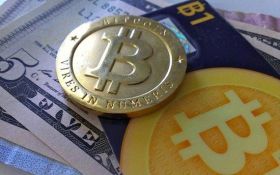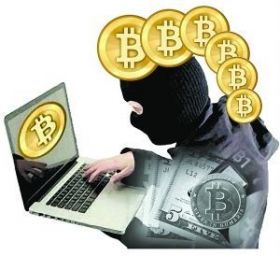Difference between revisions of "Bitcoin"
imported>Ciic |
imported>Ciic |
||
| (2 intermediate revisions by the same user not shown) | |||
| Line 1: | Line 1: | ||
[[Image:Bitcoin 2.JPEG|thumb|280px]] | [[Image:Bitcoin 2.JPEG|thumb|280px]] | ||
| − | The '''bitcoin''' ('''比特币''') is an open source peer-to-peer crypto-currency that enables anonymous and relatively secure transactions without any centralized authority. | + | The '''bitcoin''' ('''比特币''') is an open source peer-to-peer crypto-currency that enables anonymous and relatively secure transactions without any centralized authority. |
| − | The concept was first introduced by pseudonymous developer Satoshi Nakamoto in November 2008. Bitcoin units are created by complex computer algorithms based on a set of cryptography codes and function without the intermediation of a central authority. | + | The concept was first introduced by pseudonymous developer Satoshi Nakamoto in November [[2008]]. Bitcoin units are created by complex computer algorithms based on a set of cryptography codes and function without the intermediation of a central authority. |
| − | == Transactions == | + | == Transactions == |
| − | + | [[Image:Bitcoin 1.JPEG|thumb|280px]] | |
| − | + | Managing transactions and issuing money are carried out collectively by the network. | |
| − | + | Bitcoin-currency verifies transactions with the same state-of-the-art encryption that is used in military and government applications to prevent double-spending. | |
| − | + | Once validated, every individual transaction is permanently recorded in a public ledger known as the block-chain. | |
| − | As bitcoin can be transferred through computers or smartphones without an intermediate financial institution. The currency has thus far been accepted in trade by merchants and individuals in many parts of the world. | + | Bitcoins are stored by associating them with addresses called "wallets." Wallets can be stored on web services, on local hardware such as PCs and mobile devices or on paper print-outs. |
| + | |||
| + | As bitcoin can be transferred through computers or smartphones without an intermediate financial institution. The currency has thus far been accepted in trade by merchants and individuals in many parts of the world. | ||
Like gold, bitcoins are valuable because of their scarcity. The bitcoin money supply is limited to 21 million units. The total number of in circulation just hit 10.5 million. | Like gold, bitcoins are valuable because of their scarcity. The bitcoin money supply is limited to 21 million units. The total number of in circulation just hit 10.5 million. | ||
| Line 20: | Line 22: | ||
On October 28, 2013, the world's first bitcoin ATM opened at a coffee shop in Vancouver, Canada. The machine allows for users to exchange their credits of the digital currency for cash and vice-versa. | On October 28, 2013, the world's first bitcoin ATM opened at a coffee shop in Vancouver, Canada. The machine allows for users to exchange their credits of the digital currency for cash and vice-versa. | ||
| − | The machine is operated by the bitcoin exchange companies Bitcoiniacs and Robocoin, and performs transactions after a palm and ID scan. Four more ATMs are planned to be installed across the country in the near future. | + | The machine is operated by the bitcoin exchange companies Bitcoiniacs and Robocoin, and performs transactions after a palm and ID scan. Four more ATMs are planned to be installed across the country in the near future. |
| − | == In China == | + | == In China == |
| − | The bitcoin currency came into the Chinese public eye in April 2013, when movie star | + | The bitcoin currency came into the Chinese public eye in April 2013, when movie star [[Jet Li]]'s [[One Foundation]] received a donation of several hundreds of bitcoin units to help quake-stricken Sichuan. |
| − | The virtual currency has been heating up ever since. On November 18, 2013, the country's largest bitcoin trading platform, BTC China, received an investment of US$5 million. The platform's daily volume of business has now exceeded 10,000 bitcoin units -- over 200 million yuan (US$33 million). | + | The virtual currency has been heating up ever since. On November 18, [[2013]], the country's largest bitcoin trading platform, [[BTC China]], received an investment of US$5 million. The platform's daily volume of business has now exceeded 10,000 bitcoin units -- over 200 million yuan (US$33 million). |
| − | [[Category: Economy]][[Category: Investment]] | + | [[Category:Economy]] [[Category:Investment]] |
Latest revision as of 07:29, 29 November 2013
The bitcoin (比特币) is an open source peer-to-peer crypto-currency that enables anonymous and relatively secure transactions without any centralized authority.
The concept was first introduced by pseudonymous developer Satoshi Nakamoto in November 2008. Bitcoin units are created by complex computer algorithms based on a set of cryptography codes and function without the intermediation of a central authority.
Transactions
Managing transactions and issuing money are carried out collectively by the network.
Bitcoin-currency verifies transactions with the same state-of-the-art encryption that is used in military and government applications to prevent double-spending.
Once validated, every individual transaction is permanently recorded in a public ledger known as the block-chain.
Bitcoins are stored by associating them with addresses called "wallets." Wallets can be stored on web services, on local hardware such as PCs and mobile devices or on paper print-outs.
As bitcoin can be transferred through computers or smartphones without an intermediate financial institution. The currency has thus far been accepted in trade by merchants and individuals in many parts of the world.
Like gold, bitcoins are valuable because of their scarcity. The bitcoin money supply is limited to 21 million units. The total number of in circulation just hit 10.5 million.
On October 28, 2013, the world's first bitcoin ATM opened at a coffee shop in Vancouver, Canada. The machine allows for users to exchange their credits of the digital currency for cash and vice-versa.
The machine is operated by the bitcoin exchange companies Bitcoiniacs and Robocoin, and performs transactions after a palm and ID scan. Four more ATMs are planned to be installed across the country in the near future.
In China
The bitcoin currency came into the Chinese public eye in April 2013, when movie star Jet Li's One Foundation received a donation of several hundreds of bitcoin units to help quake-stricken Sichuan.
The virtual currency has been heating up ever since. On November 18, 2013, the country's largest bitcoin trading platform, BTC China, received an investment of US$5 million. The platform's daily volume of business has now exceeded 10,000 bitcoin units -- over 200 million yuan (US$33 million).

